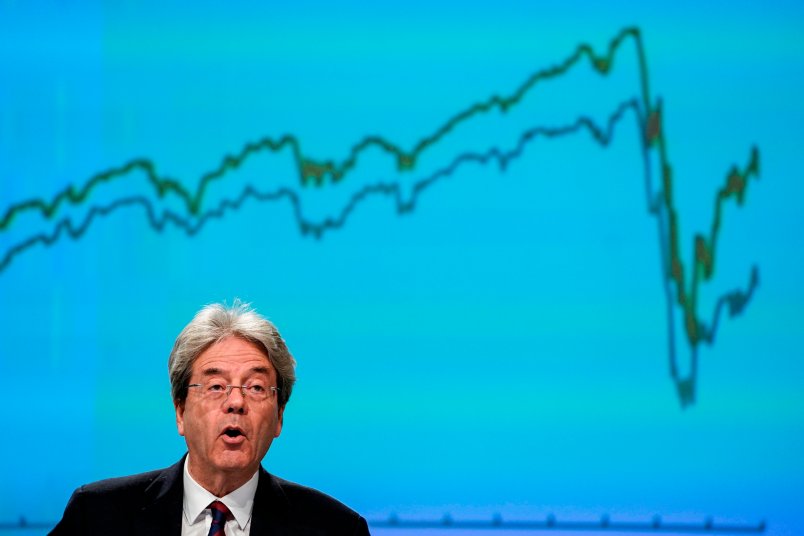BRUSSELS (AP) — The European Union predicted Wednesday “a recession of historic proportions this year” due to the impact of the coronavirus as it released its first official estimates of the damage the pandemic is inflicting on the bloc’s economy.
The 27-nation EU economy is predicted to contract by 7.5% this year, before growing by about 6% in 2021. The group of 19 nations using the euro as their currency will see a record decline of 7.75% this year, and grow by 6.25% in 2021, the European Commission said in its Spring economic forecast.
“It is now quite clear that the EU has entered the deepest economic recession in its history,” EU Economy Commissioner Paolo Gentiloni told reporters in Brussels. As the virus hit, “economic activity in the EU dropped by around one third practically overnight,” he said.
More than 1.1 million people have contracted the virus across Europe and over 137,000 have died, according to the European Centre for Disease Prevention and Control. Unclear outbreak data, low testing rates and the strain on health care systems mean the true scale of the pandemic is much greater.
With the spread slowing in most European countries, people are cautiously venturing out from confinement and gradually returning to work, but strict health measures remain in place amid concern of a second wave of outbreaks and any return to something like normal life is at least months away.
The pandemic has hurt consumer spending, industrial output, investment, trade, capital flows and supply chains. It has also hit jobs. The unemployment rate across the 27-nation EU is forecast to rise from 6.7% last year to 9% in 2020 but then fall to around 8% in 2021, the commission said. Beyond that, Gentiloni said, “we will have a massive drop in hours worked.”
Globally, the pandemic is expected to cause the deepest recession in living memory, with the International Monetary Fund forecasting a 3% decline this year. The UN says that is expected to cause a drop in work hours equivalent to 305 million full-time jobs.
Inflation in Europe is also set to be significantly weaker as consumer prices fall amid a sharp weakening of demand and drop in oil prices. Investment too is likely to contract, with firms expected to postpone or cancel their investment plans amid the uncertainty. Exporters will not be spared, with continued disruption to movements of people, goods and services likely.
Italy and Spain – two of the countries hardest hit by the virus – and to a lesser extent France are among the economies that will suffer most. Greece, which largely escaped the disease but whose economy was ravaged previously by its debt crisis and which relies heavily on tourism, is also high on the economic hit list.
France’s economy is expected to shrink by about 8.2%, while Germany will endure a moremoderate contraction than most and recover better. Still, it is set to experience this year its worst recession since World War II, with exports notably hit, with a drop in output of 6.5%.
While the virus hit every member country, the extent of the damage it ultimately inflicts will depend on the evolution of the disease in each of them, the resilience of their economies and what policies they put in place to respond.
Gentiloni said that the depth of the recession and the strength of recovery will be uneven across the world’s biggest trading bloc.
Much will depend, he said, on “the speed at which lockdowns can be lifted, the importance of services like tourism in each economy and by each country’s financial resources. Such divergence poses a threat to the single market and the euro area – yet it can be mitigated through decisive, joint European action.”
How quickly things can change. On Feb. 13, the commission had predicted “a path of steady, moderate growth” this year and next of 1.2%. At that time, uncertainty over U.S. trade policy and a Brexit trade deal plus tensions in Latin America and the Middle East were the main threats.
The coronavirus outbreak in China was noted at the time as “a new downside risk” but the commission’s assumption less than three months ago was “that the outbreak peaks in the first quarter, with relatively limited global spillovers.”



